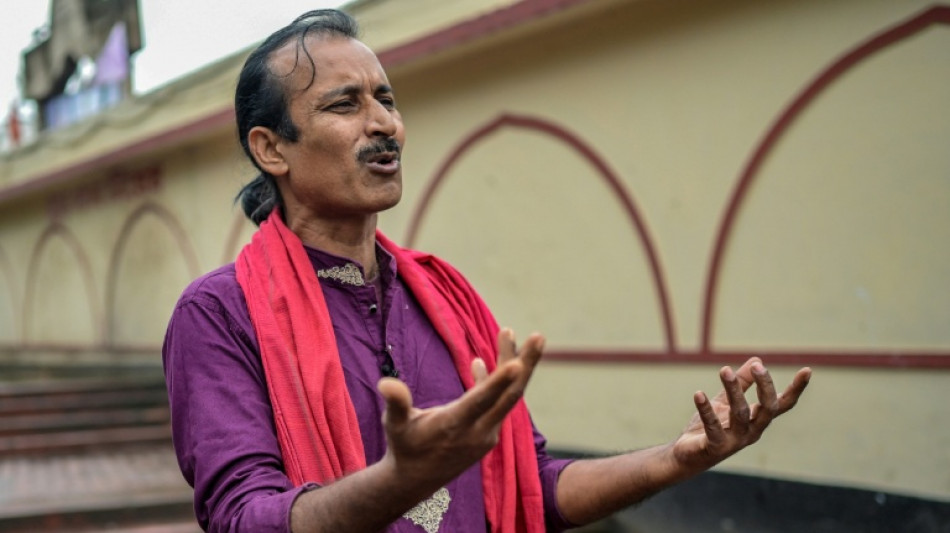

Bangladesh mystic singers face Islamist backlash
Sufi singer Jamal has spent decades devoted to his craft but now fears for his future as hardline Islamists gain ground in post-revolution Bangladesh.
Conservative Muslim groups regard Sufism as deviant, opposing its mystical interpretation of the Koran.
The movement is highly popular in Muslim-majority Bangladesh, but followers say they have faced unprecedented threats since the ouster of former prime minister Sheikh Hasina in August last year following a mass uprising.
Hasina took a tough stand against Islamist movements during her autocratic 15-year rule, and since her ouster, Islamist groups have become emboldened, with security forces stretched.
At least 40 Sufi shrines have come under attack in the past few months, according to official figures, with vandalism, arson and other violence linked to Islamist hardliners.
Other estimates put the number at twice as high.
Musical performances, once a mainstay at Sufi shrines, have sharply declined.
"It's been difficult for the last one-and-a-half decades but after August 5 things have deteriorated significantly," said Jamal, on the sidelines of a musical gathering at a centuries-old shrine in Dhaka.
"We used to perform in 40 programmes per season but now it's down to 20 due to resistance from some people," added the 50-year-old.
In addition, Bangladesh's ascetic minstrels, Baul folk singers who wander on foot from town to town singing and begging for alms, are also feeling the heat.
While separate from Sufis, they are also branded heretics by some Islamists.
Sardar Hirak Raja, general secretary of the Bangladesh Baul and Folk Artists Association, said more than 300 musical performances had to be cancelled since last year because of pressure from Islamist hardliners.
"The Sufi singers are in crisis because there aren't enough programmes," he told AFP.
- 'Inappropriate music' -
In northern Bangladesh's Dinajpur this year, a vigilante group vandalised a popular shrine, accusing it of hosting "inappropriate music".
Similar disruptions have been reported across the country.
Many of these attacks have been claimed by "Tauhidi Janata" (people of faith), an umbrella group of Muslim radicals who insist music is forbidden in Islam.
Hefazat-e-Islam -- a platform of religious seminaries also accused of mobilising people to attack shrines -- said it opposed musical gatherings.
"A group of people gather at shrines, consume cannabis and hold music fests, all of which are prohibited in our religion," said its general secretary, Mawlana Mamunul Haque.
Experts say the conflict between codified Islam and its mystical offshoots goes back far into the past.
"Sufi singers and Bauls have been attacked repeatedly over the past decade but such incidents have become more frequent now," said Anupam Heera Mandal who teaches folklore in the state-run Rajshahi University.
"Since they rarely file complaints, the crimes committed against them often go unpunished."
Bangladesh's interim government, headed by Nobel Peace Prize winner Muhammad Yunus, has been criticised for going soft on the alleged vandals, with police making only about 23 arrests so far.
Mostofa Sarwar Farooki, who heads the country's cultural affairs ministry, downplayed the threat, calling the scale of the violence "relatively low".
"Whenever a festival is cancelled, we help the organisers hold it again," Farooki told AFP.
- 'More powerful now' -
But critics say the measures are insufficient.
"For mystical singers, the lyrics are not just words -- they carry knowledge. Through music, they spread this philosophy," said Faisal Enayet, a marketing graduate and Sufi music enthusiast.
"Some people are trying to silence them."
Sufi singer Shariat Bayati, whom Islamist groups have in the past targeted with police complaints, said the harassment continued.
"I couldn't hold a programme in my courtyard last March," he said. "Those who filed the cases are more powerful now and they keep threatening me."
Mystic practitioners, however, say they are turning to their core beliefs to weather the storm.
"For mystic singers, it's imperative to overcome anger," Fakir Nahir Shah, one of the country's best-known Bauls, said at a recent gathering of ascetics in Kushtia, widely celebrated as Bangladesh's cultural capital.
"Modesty is the path we've deliberately chosen for the rest of our lives."
C.P.Wilson--RTC


